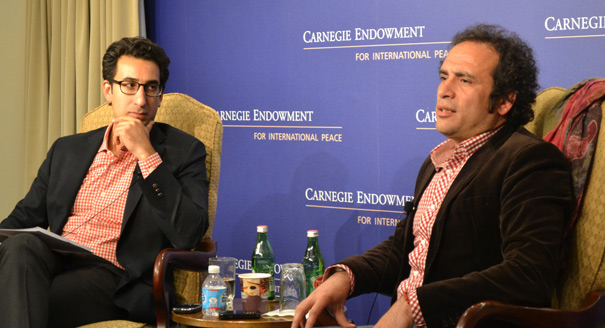Registration
Thank you!
You will receive an email confirming your registration.
Opposition groups in Egypt face a range of challenges amidst the country’s rapidly changing political context. Amr Hamzawy, founder of the Free Egypt Party, joined Carnegie’s Karim Sadjadpour for a discussion of current political dynamics in the country and the role the opposition is playing.
Changing Dynamics
- No Trust: Hamzawy explained that the relationship between the opposition and the government is marked by a mutual lack of trust. This situation, he argued, has led to the Muslim Brotherhood making unilateral economic and political decisions due to the inability of factions to agree.
- Political Deadlock: The current political deadlock has offered growing signs of the inability of President Morsi to govern, Hamzawy argued. He pointed to the frequent decrees issued by the presidency that are not listened to and the overall inability by the government to accomplish “anything real”. Hamazwy argued that growing sectarian tensions, dismissed by President Morsi as quarrels, show a president unable to tackle issues and create policy solutions. He concluded that this leads to Egyptians being further disenchanted with politics for its failure to offer any solutions to improve their lives.
- Disappointing Opposition: Hamzawy stressed that public opinion varies in its view of the opposition National Salvation Front. He explained that opposition leaders talk a great deal but do not deliver on their promises, leading to growing frustration from supporters who are losing patience with the state of the political process.
- Troubling Debt: Hamzawy described the country’s growing debt as deeply troubling, pointing out that Egypt has $38 billion in foreign debt, nearly 20 percent of which is owned by the Qatari government. Hamzawy argued that Egypt’s increased borrowing and growing dependence could have very negative consequences in the future.
Path Forward
- Early Elections: Hamzawy stated that if the president and his Muslim Brotherhood affiliated political party—the Freedom and Justice Party—continue to perform as they have been over the previous ten months then there will be no option but to call for early presidential elections. He explained there is a growing sense in Egypt that the president and the government have no vision of how to manage the social and economic problems that are often ignored by overshadowing political crises. Hamazwy concluded by pointing to the continued human rights violations, which he said have eaten away at the president’s moral legitimacy, and stressed that the only path forward in avoiding undesirable early elections would be for the president to change course.
- Space for Opposition: Hamzawy dismissed claims that the opposition has only objected to the president’s proposals without offering substantive alternatives. He explained that they have been making suggestions, but those proposals have not been taken seriously. Hamzawy argued for the need to provide the opposition with real space to join the political process. He suggested that the Muslim Brotherhood chooses not to include the opposition because it believes that it can rule Egypt single handedly.
- No Military: Hamazawy rejected calls by some non-Islamists asking for military intervention. He asserted that politicians claiming to be liberals who ask for intervention betray the democratic ideals fought for in the revolution and that every effort must be made to keep the army out of formal politics.
